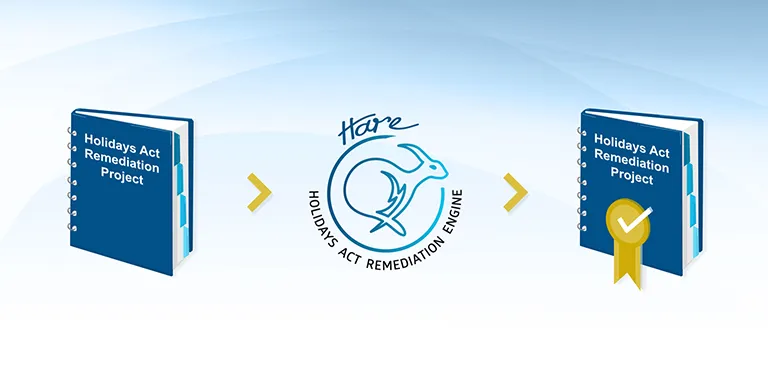
Many New Zealand businesses are facing the daunting task of ensuring Holidays Act compliance. With potential liabilities at stake, navigating this complex legislation can feel overwhelming. But it doesn’t have to be.
That’s where Mero comes in. Our cloud-based Holidays Act Remediation Engine (HARE) enables you to confidently tackle this challenge head-on. Our engine meticulously recalculates historical leave and payment entitlements, even for large organisations with thousands of employees. We handle the complex computations, ingesting data from your payroll systems to provide a clear picture of your liabilities.
A fair and efficient approach
On all of our projects, we prioritise a fair and efficient approach to ensure that employees are not disadvantaged while also minimising the overall liability for the organisation. This sets the tone for the project, guiding decision-making that prioritises meeting audit and contractual obligations while keeping the process simple and minimising potential liabilities.
Key drivers for a smooth Holidays Act remediation project
Over years of successful Holidays Act remediation projects, we’ve identified key drivers for achieving a smooth and efficient remediation project:
Discovery – Data is your compass
- The quality and availability of your data is crucial. Invest time in analysing your existing data to understand what you have. In the design phase of your remediation project, only available data can be included in a recalculation.
- Uncover and challenge any internal assumptions or myths about employee leave entitlements. This can lead to a more accurate and efficient remediation approach.
Design – A clear roadmap for remediation
- Scope Definition: Clearly define the scope of your remediation project so you have an understanding of what you are going to remediate. Establish the specific period you are reviewing and the types of leave entitlements being recalculated.
- Methodology: Develop a clear and comprehensive methodology for calculating payments across all your payroll data. Ensure this methodology is aligned with your data capabilities.
- Compliance Focus: Align your design with relevant audit, contractual, and regulatory requirements. This will ensure a thorough and compliant remediation process.
- Early Testing: Test your design with sample data to identify and address any potential issues early on. This proactive approach can save significant time and cost later in the project.
- Scenario Analysis: Run different design scenarios to understand the impact of various design choices. This can help you identify the most cost-effective and efficient solution.
Build – Leverage technology for efficiency
- Utilise a Proven Tool: Developing a remediation model from scratch is time-consuming, expensive, and complex. Consider leveraging existing tools, such as Mero’s Holidays Act Remediation Engine (HARE), that has been successfully used for other organisations and has undergone rigorous auditing, compliance, and MBIE reviews.
- Flexibility & Adaptability: Ensure the chosen tool is flexible enough to meet your specific requirements and allows for testing various scenarios.
Refinement – Iterate for optimal results
- Continuous Improvement: Constantly refine your remediation model to optimise accuracy and minimise liabilities.
- Handling Data Issues: Establish a clear and auditable process for handling data inconsistencies or errors.
- Agility: Ensure you can easily adjust and rerun your remediation model for ongoing refinement and improvement.
- Know When to Stop: Recognise the point where further refinement becomes unproductive and the potential liability reduction is outweighed by the effort required.
Testing – Ensure accuracy and identify outliers (that can significantly reduce your bill!)
- Design Validation: Thoroughly test your model against your design specifications to confirm accurate calculations.
- Outlier Analysis: Test outliers, both under and overpayments. This can help you reduce the impact of data issues, and identify areas in your model that are not quite correct.
Management – Proactive communication and support
- Employee Queries: Once payments are made, you will have employees that ask you to explain how their amounts were derived. Have a plan, and tool like the HARE Reporting Console, to enable your HR team to answer these queries.
- Terminated Employees: Identification and authorisation is a complex area. Use a tool such as the HARE Employee Claims Portal that will help you manage the claims process.
The biggest driver for success is to partner with an organisation that has done this before
Holidays Act remediation can be a complex and challenging process. Partnering with an experienced organisation like Mero can provide invaluable guidance and support throughout the project. Our team of experts will help you navigate the complexities, avoid common pitfalls, and achieve a successful outcome.
Great conversations lead to great outcomes, so contact us today for a business discovery session, so we can help you achieve compliance and minimise your liabilities.

